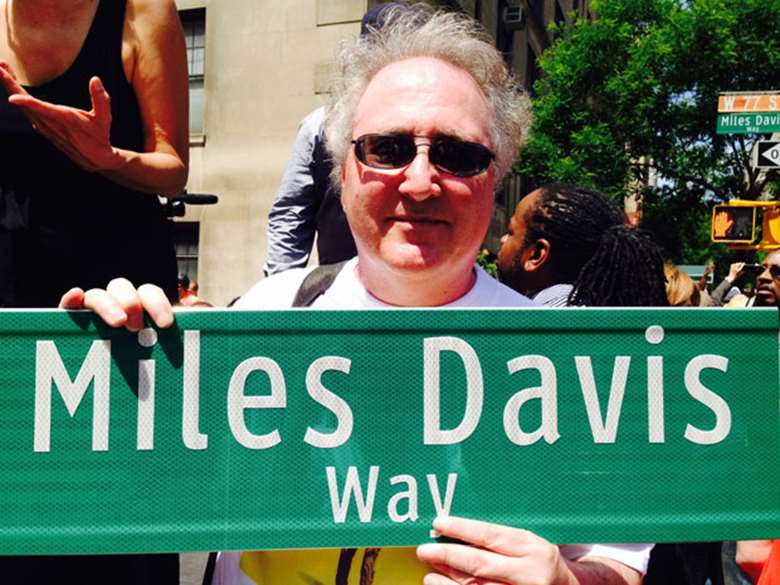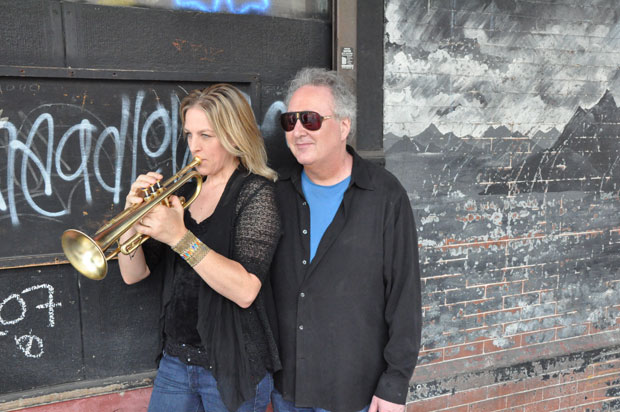Across the Miles: an interview
Wednesday, December 23, 2015
Over the years, keyboardist/programmer Jason Miles has evolved from performer to producer.

Best known for his work with Marcus Miller on the groundbreaking Miles Davis album Tutu (and the follow-up albums, Siesta and Amandla), he has collaborated with an extensive range of jazz musicians including Joe Sample, David Sanborn, Michael Brecker, The Crusaders and George Benson. He has recorded a string of solo albums, tribute albums to artists such as Weather Report, Ivan Lins and Grover Washington Jr and released special projects like Global Noize and Kind of New. For more on Jason’s music visit his website www.jasonmilesmusic.com. Jazzwise’s George Cole caught up with Jason on a recent visit to London.
Jazzwise: What brings you to Europe?
Jason Miles: I’m producing two albums with the British jazz singer Beverley Beirne, and I’m promoting my album Kind of New.
JW: How do you see the music industry today?
JM: I’ve created a forum on Facebook that is based around life and music. I make my musical points very strongly, because there are lots of issues about the way music is going down right now. One of the issues that I keep putting out is that there are a lot of great young players, but they don’t know how to make an album. Many bands go into a studio and come out with recorded music on a CD, but I don’t call it a record. There’s a big difference between what us old timers think is a record, which is a complete statement that has continuity and production values. These are the things that make you want to listen to the music more than once. So, I’m always preaching that you are not taking care of producers and it’s producers that made the music business. I was taught how to make an album – I learnt from the masters, so that’s what I preach: you can be a great player and have a great band, but that doesn’t mean you can go into a studio and know how to make a record.
JW: How did you get involved with Beverley Beirne?
JM: Some people go on Facebook and ask if I would be interested in producing them, and I say, ‘send me some stuff and if you cut the mustard and can pay me some money, I’ll do it’. Beverley’s husband contacted me and asked if I would be interested in working with her. They sent me some stuff and told me about their ideas, which I loved.
JW: Can you tell us a little about the project?
JM: The first album, which is set for release in spring 2016, is called Jazz Just Wants to Have Fun, and you’ve got all these cool, old tunes and a great bunch of young musicians. There’s Sam Watts on piano; Rob Hughes (sax/flute); Flo Moore (bass) and Ben Brown (drums). Beverley’s got a very smooth voice, with great emotion and good pitch – she’s a pro. The second album is a more traditional recording.

JW: Your latest album, Kind of New, recorded with trumpeter Ingrid Jensen, got a good reception in the US and UK, and is now it’s being promoted all over Europe. What’s the background to it?
JM: When I made my album Miles to Miles (2005) I had different trumpet players on it (Randy Brecker, Barry Daniellan, Tom Harrell and Nicholas Payton), this time it was concentrated around one. I had known Ingrid Jensen for a long time and I think she’s a superb musician. What inspired the album was Miles’s Cellar Door sessions. I’ve always loved the sound of the Fender Rhodes. In 1988, I was hanging out with Miles and I said to him, 'I was listening to Bitches Brew with Chic Corea and Joe Zawinul, and was wondering, who was your favourite keyboard player?’ and he said, ‘Keith Jarrett’. I said, ‘Really?’ and Miles replied, 'He was a funky motherfucker!’ Later on, (the late saxophonist/producer) Bob Belden, gave me a copy of The Cellar Door Sessions and I so got into it – Keith was running the show and so funky. Michael Henderson’s bass intro on 'What I Say', wow! With Kind of New I wanted to create a small ensemble that would bring back that kind of spirit. I also wanted to mix in some live tracks.
JW: Your music is eclectic and so hard to pigeon-hole. It often gets dubbed ‘smooth jazz'.
JM: When I was playing at the Cape Town Jazz Festival, a journalist asked what music had had a big impact on me and I said 'smooth jazz', and the reaction was like, 'What! smooth jazz!' So I said, 'Yes, the smooth jazz of CTI, The Crusaders, Bob James, that’s the smooth jazz I like, though real contemporary jazz is a better name. It was an open-ended system where you could work with anyone and could try anything – Freddie Hubbard’s High Energy is like his Bitches Brew! That was the freedom that we had. Because I’ve done some records that had to be labelled – like To Grover With Love – they call it smooth jazz. No, because I’m not in that market, though some people who like smooth jazz, also liked the album. The contemporary jazz tag covers a lot of music – look at the stuff Lee Ritenour was doing, or the first few albums by Fourplay [a band that started out with Bob James, Lee Ritenour, Nathan East and Harvey Mason], which were very adventurous – that band was pushing the envelope.
JW: How did you get into synthesisers?
JM: It was in 1972, and I was walking by my campus and I heard a sound coming from the music hall. I walked in and there was this guy on stage with a little table and a box sitting on it. I go, ‘Who are you?’ and he says, ‘I’m Bob Moog.’ He tells me that the box is a Minimoog. I loved the sound.
JW: Describe the impact of Tutu on Miles Davis.
JM: Before Tutu, Miles was making music and there was a vibe, but it wasn’t taking music in a new direction. Albums like Decoy, You’re Under Arrest and The Man With The Horn were really nice, but suddenly Tutu came along and it went big-time. Producer Tommy Lipuma got George Duke and Marcus Miller and you got the first synthetic jazz album. People have a golden period for writing and I think that was when it was for Marcus. His writing was so focused and he had a real sense of what was happening. We were creating something that no one else was creating and Miles said that Tutu saved his career.
JW: Some of the jazz police were not happy with Tutu. Do you think that if something as ground-breaking was released today sections of the jazz community would be more accepting than they were back in the 1980s?
JM: No, because in their eyes, jazz is acoustic; it’s the music of America. It is, but guess what? No one wants to stay in the same place – Miles never did.
JW: Almost everyone who worked with Miles Davis gets asked, what they got from him, but I want to turn the question around – what did Miles get from you?
JM: I think I gave him the realness of a person, someone who wasn’t there because he was Miles. I think my wife Kathy and I brought him a spirit, people who were very honest. That was important to him. And I think I was somebody who was into the spirit of the new music, who knew what these instruments were able to do and what they could create. I think that was important to him. One of the greatest things in my life was meeting Miles, because he gave me a validity.
JW: You once said that jazz tends to draw on the same pool of musicians. Do you think enough young musicians play jazz?
JM: I don’t think there are enough musicians who respect history enough. There are young musicians who think that Snarky Puppy or Robert Glasper are more relevant than Miles. I keep telling them, ‘they are great musicians, but they didn’t invent or reinvent the scene – they didn’t change music four times’. No Bitches Brew – jazz would have died.
JW: Global Noize is another well-received project. Any future plans?
JM: I would like to do another Global Noize project. I have an idea for a project based around 'world colours' and incorporating different genres, like Brazil meets India. I’d also like to do a live version of Kind of New with different musicians and a bigger ensemble.
JW: When will we see your next album?
JM: It’s coming out around March on Whaling City Sound and it’s called To Grover With Love, Live in Japan. It’s my version of the sound you used to get in those old New York clubs like Mikkels and 7th Avenue South – I love that sound. The band was Buddy Williams (drums), Gerald Veasley (bass), Nicky Moroch (guitar), Andy Snitzer and Eric Darius (sax) and Ralph MacDonald – it was one of his last gigs [MacDonald died in 2011]. It was recorded over four nights in June 2010 and we’re taking the best tracks. I’m really happy this music is finally coming out.
– Story by George Cole
– Photo by Jean-Pierre Leduc